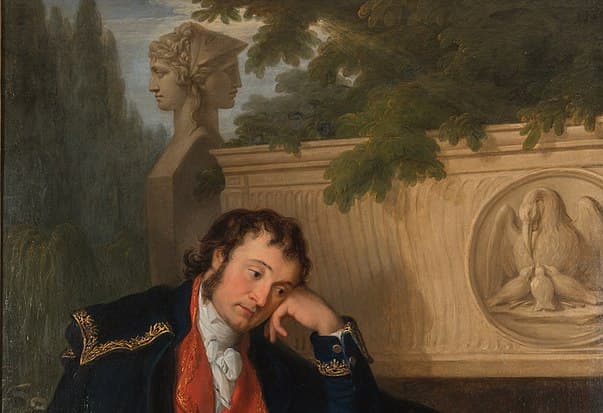Poem of the Day: ‘Luke Havergal’
The crimson leaves of autumn, the wind, the gate in a garden: This is sweet and deadly poetry.

Last year, a lawsuit was brought against Netflix, with the plaintiffs arguing that “Thirteen Reasons Why,” a fictional series about the aftermath of a teen suicide, led to an actual teen’s suicide, with Netflix legally responsible. This past January, a federal judge dismissed the case in the name of free speech, artistic freedom, and a set of legal technicalities.
And good thing, too. Shall we sue anyone who lectures on “The Sorrows of Young Werther” or “Romeo and Juliet”? Reads A.E. Housman’s poetry? Listens to “Don’t Fear the Reaper”? Nothing makes me want to glamorize suicide more than the attempt to say that it is banned as an artistic topic. Art claims the universe as its grasslands, and it has to be free to graze in every paddock — just as we have to be free to reject that art when it errs.
Under the plaintiffs’ theory, we would have to erase the large portion of English poetry that casts its eye on suicide. “I have been half in love with easeful Death,” as Keats once wrote. “Now more than ever seems it rich to die, / To cease upon the midnight with no pain.” Hamlet contemplates self-slaughter in two soliloquies: “’tis a consummation / Devoutly to be wish’d. To die, to sleep.”
Sometimes the canon of suicide poetry merely imagines the act. Langston Hughes’s “Suicide’s Note,” for example: “The calm, / Cool face of the river / Asked me for a kiss.” And sometimes the poems refuse easeful death in the name of duty and responsibility. This past September, The New York Sun featured as its Poem of the Day Robert Frost’s “Stopping by Woods on a Snowy Evening.” The snow-filled woods — “lovely, dark and deep” — call to the speaker of the poem, but in the end he turns away from the lovely stillness of death because he has “promises to keep / And miles to go” before he sleeps.
Today’s Poem of the Day, from E.A. Robinson (1869–1935), looks at the urge for easeful death that Frost rejected. Though present in most anthologies, Robinson is underappreciated as one of America’s greatest poets. And his “Luke Havergal” may be the most beautiful suicide poem ever written. In eight-line stanzas — seven lines of pentameter with a two-foot line at the end, trailing away — and only two rhymes in each stanza, Robinson shows us a lover mourning the death of his belovèd. And the lover hears the voice (“Out of a grave I come to tell you this”) that charges him to go the western gate: “there is yet one way to where she is.” The crimson leaves of autumn, the wind, the gate in a garden: This is sweet and deadly poetry. And if we do not appreciate the power of the urge to lay ourselves down in the final sleep, how will we resist it?
Luke Havergal
by Edwin Arlington Robinson
Go to the western gate, Luke Havergal,
There where the vines cling crimson on the wall,
And in the twilight wait for what will come.
The leaves will whisper there of her, and some,
Like flying words, will strike you as they fall;
But go, and if you listen she will call.
Go to the western gate, Luke Havergal —
Luke Havergal.
No, there is not a dawn in eastern skies
To rift the fiery night that’s in your eyes;
But there, where western glooms are gathering,
The dark will end the dark, if anything:
God slays Himself with every leaf that flies,
And hell is more than half of paradise.
No, there is not a dawn in eastern skies —
In eastern skies.
Out of a grave I come to tell you this,
Out of a grave I come to quench the kiss
That flames upon your forehead with a glow
That blinds you to the way that you must go.
Yes, there is yet one way to where she is,
Bitter, but one that faith may never miss.
Out of a grave I come to tell you this —
To tell you this.
There is the western gate, Luke Havergal,
There are the crimson leaves upon the wall.
Go, for the winds are tearing them away, —
Nor think to riddle the dead words they say,
Nor any more to feel them as they fall;
But go, and if you trust her she will call.
There is the western gate, Luke Havergal —
Luke Havergal.
___________________________________________
With “Poem of the Day,” The New York Sun offers a daily portion of verse selected by Joseph Bottum with the help of the North Carolina poet Sally Thomas, the Sun’s associate poetry editor. Tied to the day, or the season, or just individual taste, the poems will be typically drawn from the lesser-known portion of the history of English verse. In the coming months we will be reaching out to contemporary poets for examples of current, primarily formalist work, to show that poetry can still serve as a delight to the ear, an instruction to the mind, and a tonic for the soul.
